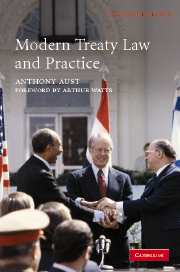Book contents
- Frontmatter
- Contents
- Foreword to the first edition by Sir Arthur Watts
- Preface to the second edition
- Articles of the Convention cited in the text
- Table of treaties
- Table of MOUs
- Table of cases
- Glossary of legal terms
- List of abbreviations
- Introduction
- 1 Vienna Convention on the Law of Treaties 1969
- 2 What is a treaty?
- 3 MOUs
- 4 Capacity to conclude treaties
- 5 Full powers
- 6 Adoption and authentication
- 7 Consent to be bound
- 8 Reservations
- 9 Entry into force
- 10 Treaties and domestic law
- 11 Territorial application
- 12 Successive treaties
- 13 Interpretation
- 14 Third states
- 15 Amendment
- 16 Duration and termination
- 17 Invalidity
- 18 The depositary
- 19 Registration and publication
- 20 Dispute settlement and remedies
- 21 Succession to treaties
- 22 International Organisations
- 23 Drafting and final clauses
- Appendices
- Index
Preface to the second edition
- Frontmatter
- Contents
- Foreword to the first edition by Sir Arthur Watts
- Preface to the second edition
- Articles of the Convention cited in the text
- Table of treaties
- Table of MOUs
- Table of cases
- Glossary of legal terms
- List of abbreviations
- Introduction
- 1 Vienna Convention on the Law of Treaties 1969
- 2 What is a treaty?
- 3 MOUs
- 4 Capacity to conclude treaties
- 5 Full powers
- 6 Adoption and authentication
- 7 Consent to be bound
- 8 Reservations
- 9 Entry into force
- 10 Treaties and domestic law
- 11 Territorial application
- 12 Successive treaties
- 13 Interpretation
- 14 Third states
- 15 Amendment
- 16 Duration and termination
- 17 Invalidity
- 18 The depositary
- 19 Registration and publication
- 20 Dispute settlement and remedies
- 21 Succession to treaties
- 22 International Organisations
- 23 Drafting and final clauses
- Appendices
- Index
Summary
I am, in plainer words, a bundle of prejudices – made up of likings and dislikings.
The first edition of this book was written and published when I was still employed by the British Diplomatic Service. Although I was generally allowed to express my own views, being still a public servant, I had sometimes to exercise restraint. Since retiring in 2002, I have been free to say and write what I like. Although I hope I am no more prejudiced than anyone else, in this edition I can give more of my personal views. Identifying them is a simple matter; merely compare what I said in the first edition with what I say now, as on reservations made on ‘re-accession’.
Although this edition may look much like the first, since it follows its general form and layout, every page has changes, some substantial; and even a few corrections. A lot of the material has been updated. Some arguments have been refined, for example, on the legal rationale for MOUs. New material has been added, for example, the use of MOUs in litigation; the treaty-making capacity of some odd ‘states’, such as the Cook Islands, the Vatican, Taiwan and Palestine; Article 46; the effect of hostilities on treaties; third state nationals and treaties; ‘unsigning’ a treaty; reviving a treaty; and so-called unequal treaties. Given their increasing importance for treaties, there is a new chapter on international organisations, including an attempt to explain the sometimes baffling role in treaty-making played by the European Community/Union.
- Type
- Chapter
- Information
- Modern Treaty Law and Practice , pp. xxvi - xxviiPublisher: Cambridge University PressPrint publication year: 2007



